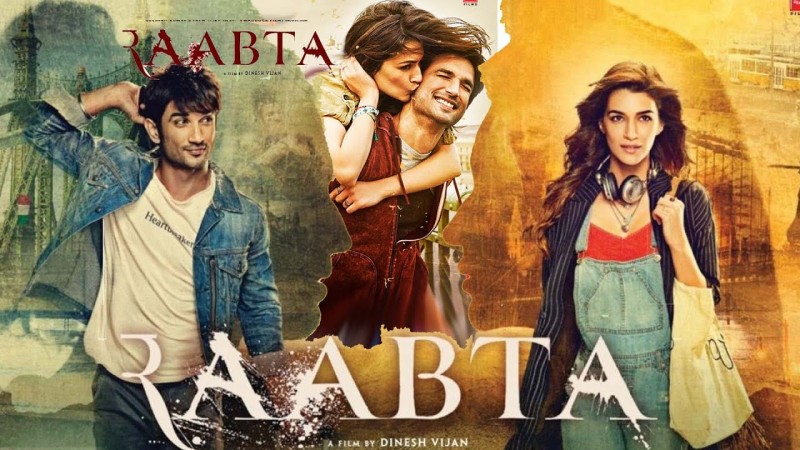
The making of a movie can be a rollercoaster ride in the constantly changing world of Indian cinema, full of unanticipated turns and twists. One such journey was that of the Bollywood movie "Raabta," whose filming began in 2015 but was significantly delayed by a year due to casting issues. This essay takes you on a thorough and elaborate journey through the highs and lows of the film's production, illuminating the difficulties encountered and the eventual success that followed.
Dinesh Vijan's romantic drama "Raabta," in Hindi, was initially intended to explore the fascinating ideas of reincarnation and destiny. The word "Raabta," which is the name of the movie, means "connection" or "relationship," which was the main theme of the story. The film, which was made by Maddock Films, promised to be a distinctive addition to Bollywood's collection of love stories.
Casting the ideal actors to play the characters is one of the first and most important steps in making any movie come to life. Casting for "Raabta" turned out to be a significant challenge from the start. Sushant Singh Rajput and Kriti Sanon, two actors who at the time were relatively unknown to the public, were among the main cast members of the movie.
The male lead, Sushant Singh Rajput, was already well known for his extraordinary talent and performances in films like "Kai Po Che!" and "Detective Byomkesh Bakshy!" It turned out to be a difficult task to find the ideal actress to match his charisma and chemistry.
Actress Alia Bhatt was initially considered for the lead female role in "Raabta". She was forced to turn down the offer, though, because of scheduling issues and other obligations. This was the movie's first incident with casting issues. Discussions with several other actresses, including Shraddha Kapoor and Deepika Padukone, resulted from the ongoing search for the female lead. Unfortunately, none of these conversations resulted in a written agreement, which made the casting conundrum worse.
The production team eventually discovered a glimmer of hope in Kriti Sanon amid the casting confusion. Kriti, who made her Bollywood debut with "Heropanti," was a relatively new face in the business, but she had already attracted attention for her acting prowess and screen presence. The "Raabta" cast felt more upbeat after her casting.
As soon as Sushant Singh Rajput and Kriti Sanon joined the project, it appeared to be ready to go. But the filmmakers and producers took an unusual course of action. They decided to postpone the movie's release by a year rather than rush it into production in order to give the lead actors time to develop their on-screen chemistry. Their determination to produce a top-notch movie that would appeal to audiences was demonstrated by this choice.
Sushant and Kriti took part in a variety of activities to develop chemistry and a rapport during the year-long delay. To get ready for their roles, they spent time together away from the set, participated in workshops, and even travelled to Europe. The success of the movie depended heavily on this investment in developing the actors' on-screen chemistry, as "Raabta" was primarily a love story that spanned multiple lifetimes.
"Raabta" had an original plot that explored the ideas of reincarnation and destiny. Two distinct timelines, one set in the present and the other in ancient India, alternated throughout the story. Sushant and Kriti played two characters—lovers from different eras whose fates were intertwined throughout the ages. The development of the lead actors' chemistry was crucial because the complex storytelling required a strong emotional bond between them.
Production on "Raabta" picked back up once the casting jigsaw was finally pieced together and the lead actors' chemistry was established. Budapest, Hungary, and the Indian state of Punjab were just two of the beautiful locations used to shoot the movie. The movie's backdrop for its love story was meticulously designed by the filmmakers to be both visually stunning and captivating.
Although the casting problems had been fixed, "Raabta"'s production still had its share of difficulties. It wasn't easy to manage the demands of a script that switched between two different time periods while shooting in multiple locations, coordinating challenging action sequences, and managing multiple locations. The cast and crew's commitment, however, made it possible to overcome these difficulties.
The catchy score that Pritam created for "Raabta" was one of its highlights. In enhancing the film's emotional impact, the music was a major contributor. Songs like "Raabta," "Ik Vaari Aa," and "Lambiyaan Si Judaiyaan" connected with the audience and boosted the movie's all-around appeal.
On June 9, 2017, "Raabta" at last made it to the big screen after a protracted and difficult journey. Critics gave the movie varying grades; some praised it for its original idea and the chemistry between the lead actors, while others thought the plot lacked substance. Although there were a variety of reviews for the movie, it still managed to attract attention and did okay at the box office.
The difficulties and tenacity involved in making a Bollywood movie are demonstrated by the "Raabta" production. The film's journey was anything but typical, starting with the initial casting issues and continuing with the choice to postpone production so that chemistry could develop. However, it was precisely these difficulties and the dedication of the cast and crew that helped "Raabta" stand out as a distinctive and enduring contribution to the canon of Indian cinema. The movie's message of enduring love and destiny struck a chord with viewers, and its cast, despite some early kinks, managed to develop an endearing on-screen chemistry. "Raabta" is a testament to the magic that can occur when a film's producers are eager to go above and beyond to provide an engrossing cinematic experience.
'Kambakkht Ishq' Exposed as a Hidden Adaptation of a Tamil Classic
Akshay Kumar and Diljit Dosanjh Get Real with "Good News" Promotions
How 'Satyaprem Ki Katha' Emerged from Religious Sensitivity in Bollywood"